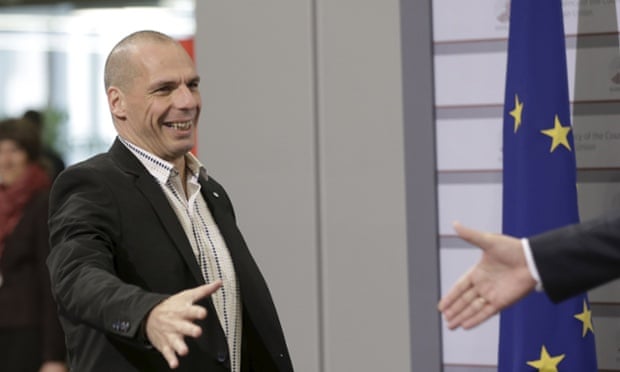Helena Smith in Athens Tuesday 28 April 2015
Syriza-led coalition appoints economics professor in leading role to overcome mounting European opposition to his controversial colleague
Insiders say Greek finance minister Yanis Varoufakis still holds a lot of sway in negotiations, despite Alexis Tsipras appointing a new coordinator. Photograph: Ints Kalnins/Reuters

Greece moved to inject fresh momentum into problem-plagued talks with creditors on Monday, reshuffling its negotiating team to try and defuse tensions over its outspoken finance minister.
Hopes that a compromise deal was imminent helped rally the markets, as the FTSE rose to a new record high in London, despite Athens insisting that Yanis Varoufakis would continue to supervise talks.
In a bid to ease tensions with lenders, the Syriza party-led coalition said the minister of international financial relations, Euclid Tsakalotos, would take over the coordination of the new team. The appointment will see the economics professor, who was raised in the UK, assuming a more active role in face-to-face negotiations with creditors.
Reacting to the news, a senior European Union official confided that it had become “impossible” to do business with Varoufakis. “It had got to the point where eyes roll,” he said. “People had got sick and tired of being lectured about austerity and the effects of the crisis. Any sympathy for Greece was eroded by his failure to draft concrete proposals.”
However, one well-placed Athens official insisted that Varoufakis’s role had been upgraded “in many ways”. The official added: “To make him resign would be to retreat and the government would never do that.”
Three months after his elevation to power, prime minister Alexis Tsipras has come under extraordinary pressure to remove Varoufakis. Yet last night Tsipras said that his finance minister “is an important asset for the government, and [with creditors] he speaks their language better then they do”. In a wide-ranging interview aired on Greek TV, Tsipras rejected suggestions that his government had any intention of sacrificing the politician. Now that negotiations with creditors were in the final straight, Greece had to reorganise its negotiating team, the PM said.
Varoufakis, the academic-turned-politician who has set the anti-austerity administration’s negotiating agenda from the outset, was rounded on by Eurozone finance ministers at an explosive meeting on Friday. Upbraided for his brash style and reckless brinkmanship, Varoufakis hit back with a tweet that borrowed one of US president Franklin D Roosevelt’s more memorial lines: “They are unanimous in their hate for me; and I welcome their hatred.”
The German finance minister Wolfgang Schauble had led the opposition against him with last week’s clash leaving Greece looking ever more isolated in its battle to keep bankruptcy at bay. Berlin has made clear that Athens will have to provide a detailed list of reforms if it is to unlock €7.2bn (£5.1bn) worth of rescue funds to avert default on debt payments in May.
Tsakalotos is expected, along with Varoufakis, to represent Greece at the next euro group meeting of finance ministers on 11 May, a make-or-break date for the government to persuade creditors at the European Union, European Central Bank and the International Monetary Fund to release funds. On 12 May it must meet a debt payment of €780m (£558m) to the IMF.
But while mild-mannered and respected, the Oxford-educated Tsakalatos is also tough, and unlikely to want to cross any of the “red lines” Tsipras’ Syriza party has set in its bid to change Greece’s economic course.
This month he told the Guardian: “I am optimistic that an interim deal will be struck if not in April then sometime soon but they [creditors] cannot expect us to enforce measures that not even the previous [pro-bailout] government could do. It is unreasonable, for example, to ask us to further lower pensions.”
After months of negotiations failing to make headway, Monday’s announcement was, however, seen as a conciliatory move. Greek shares rallied with the Athens stock exchange closing the day up 4.4%. Two-year bonds yields also fell 250 basis points to a two-week low of 23.55%.
Earlier in the day, the government had faced calls to lay off Varoufakis with immediate effect. Accusing the 54-year-old finance minister of narcissism, a former Greek foreign minister, Dora Bakoyannis, blamed him for leading Greece down a dangerous path where it was now looking into the abyss of a potential Eurozone exit. “He has to resign to make things easier for Mr Tsipras and to liberate him so that it doesn’t seem that he is being sacked on the orders of people abroad,” she told SKAI news.
“I am not at all sure that Mr Varoufakis has not adopted the logic of the drachma. He is an impediment for Greece, a drag on the talks and he has to go.”
The finance minister’s refusal to attend last week’s dinner for Eurozone finance ministers – when the debt-crippled country was so dependent on loans from participants – was unforgivable, she said.
But insiders insisted that the politician still enjoyed Tsipras’ confidence, even if the young premier was now reaching out to the German chancellor Angela Merkel in an effort to reach a political solution.
With his high popularity ratings at home, Varoufakis is credited with internationalising the country’s debt problem and raising questions over austerity economics.
“They [creditors] couldn’t counter his economic arguments rationally so they went for him claiming he didn’t understand Eurozone rules and regulations, that his reforms weren’t good enough,” said one official. “Tsipras knows this is not about Varoufakis, but his government, because it has dared to take on the system that is Europe’s neoliberal doctrine. He knows that if one goes the other goes too, which is why Varoufakis is here to stay.”
![The [Greek] European Tragedy](https://blogger.googleusercontent.com/img/b/R29vZ2xl/AVvXsEiWKI5s90SFm1wWTk6bs4p7CgslaC2SnYPsrZhb-B-smOufNNCSxCvpBLI9hOB-LsXZjir_PNmEiMk2-E62F3xkg96IoC6QFAaZAnPRTVH340IN9WBRmWJqPkjWlgyRj3zpALp7h6hvA58/s920/GkBack_new.jpg)